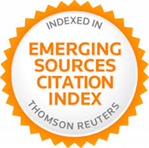
Policies
SECTION POLICIES
Monograph
Articles must be sent in Spanish. They have to be original previously unpublished pieces, and are not to be awaiting acceptation from any other publishing entity. The maximum length of articles is 10.000 words. They will be reviewed by two experts, using the system of a double-blind review.
|
X Open Submissions |
X Indexed |
X Peer Reviewed |
Miscellaneous
Articles must be sent in Spanish. They have to be original previously unpublished pieces, and are not to be awaiting acceptation from any other publishing entity. The maximum length of articles is 10.000 words. They will be reviewed by two experts, using the system of a double-blind review.
The reception of proposals for articles for the miscellany section will be open twice a year: in the months of January and June. The exact dates will be published in the Announcements section. The rest of the months, no proposals will be received.
|
X Open Submissions |
X Indexed |
X Peer Reviewed |
Author’s Approaches
|
X Open Submissions |
X Indexed |
Peer Reviewed |
Interview
Text must be sent in Spanish. They have to be original previously unpublished pieces, and are not to be awaiting acceptation from any other publishing entity. The maximum length of articles is 5.000 words. Their subject are prominent creators in the Spanish and Latin American cultural field. Interviews that have not been previously commissioned by the Editorial Board will not be accepted.
|
X Open Submissions |
X Indexed |
Peer Reviewed |
Reviews
These are short texts commenting on, or delivering information critically about, a book or a recently published monograph on any aspect related to Pasavento’s issues. The maximum length of articles is 2.500 words. Reviews that have not been previously commissioned by the Editorial Board will not be accepted.
|
X Open Submissions |
X Indexed |
Peer Reviewed |
PEER REVIEW PROCESS
Reviewers work on the university context are both national and international and are selected among renowned professionals on the subject that articles deal with. The specialists’ reports will be considered by the editorial team, who ultimately will be responsible of the final decision about the publication of such works. Received articles go through a first revision to ensure do not fall out of the scope of this journal.
The evaluation process is anonymous since the identity of authors and experts will stay hidden.
Pasavento reserves the right to postpone the publication of a selected article for internal programming reasons, after notifying the author. Likewise, it reserves the right to cancel the publication of a selected article if it does not meet the deadlines required by the editorial board during its selection or production process. It is the responsibility of the authors to meet the deadlines required at each stage of the presentation and production.
The maximal timeframe for an article’s review is 6 months.
OPEN ACCESS POLICY
Pasavento. Revista de estudios hispánicos provides immediate free access to its content under the principle of making research available to the public for free and promoting global knowledge exchange. Users can read, download, distribute, print, search, partially reproduce or make a link to the texts without requesting prior permission from the publisher or the author.
The magazine is subject to Creative Commons Attribution 4.0 Unported License
PUBLICATION ETHICS
We recommend the authors to use inclusive language in scientific articles. Authors must inform about the criteria chosen to decide the order of the signature and about the specific contribution made by each one of them to the published work. The articles must indicate the funding agency(s) and the code(s) of the project(s) that is the framework research where the publication has been developed. This data must appear referenced in the article. Pasavento. Revista de estudios hispánicos declares its commitment to respect and to the integrity of the works already published. For this reason, it will be especially strict with plagiarism, and texts that are identified as such will be eliminated from the journal or will not be published. The magazine will act, in these cases, as quickly as possible. By accepting the terms and agreements expressed by our journal, the authors must guarantee that the article and all the materials are original and do not infringe the copyrights of third parties. The authors must also justify that the text has not been previously presented or published in another media and, in the case of an article of shared authorship, there has been full consensus of all the affected authors.






